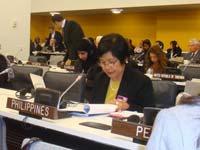Human traffickers target pregnant moms

MPs in the Philippines have called on the Manila police to hunt members of crime syndicates who are luring Filipino pregnant women to engage in the trafficking of their unborn babies to foreign countries in exchange for large amounts of money.
MPs Rufus Rodriguez and Abante Mindanao said that the recruitment of pregnant women by these syndicates to perpetuate their illegal activities should be stopped, according to media reports in Manila.
In filing a House Resolution last week, both urged the Filippino House committees on social services and welfare of children to look into the matter.
“They travel overseas legally as tourists then sell their newborns to waiting adoptive parents abroad,” Rodriguez said.
They added that the crime syndicates give them necessary travel documents, plane tickets and pocket money with the intent of having the child adopted as a form of a pre-arranged plan.
Last year a Maltese man was charged before a local court for allegedly making a false declaration to immigration authorities when sponsoring a Filipino woman who requested and obtained a Visa, but who in fact was pregnant.
The police, department for Social Welfare Standards investigated the case - which was triggered by reports of unborn child trafficking from the Philippines to Malta - and came to light during the 11th Global Consultation on Child Welfare Services held in Makati City, Philippines.
In August last year, the Philippines undersecretary for social affairs Alicia Bala expressed her concern that pregnant Filipino women were being recruited to travel overseas legally as tourists, then sell their newborns to waiting adoptive parents.
Alicia Bala was categoric that in the specific case of Malta “the mother who’s pregnant [was] sponsored to go to that place with the intent of having the child adopted.”
“This is a form of trafficking... Our attention was called by Malta authorities,” she told had reporters.
The mother has since returned to the Philippines, but her child is now undergoing procedure for adoptive parents to keep the baby in custody.
“This is just one instance but, who knows, there may be other cases that are not brought to our attention. It is a prearranged plan of giving birth there, then they give the baby up. They don’t keep the baby because there is already that intention to have the baby adopted abroad,” Bala said.
As the mothers are able to exit the country legally, such cases are hard to detect unless reported by the receiving country, she said.
“You can’t stop anyone from travelling. There’s no reason for immigration agents to be suspicious about why a pregnant woman is going overseas. Maybe there’s a facilitator here,” Bala said.
The two Filipino MPs have meanwhile reiterated Bala’s concern over the trafficking of unborn babies, but also warned that “there is no reason for immigration agents to be suspicious about why a pregnant woman is going overseas.”
They told parliament in Manila however that action must be taken to address the reality which was exposed by the United Nations Children’s Fund (UNICEF) that there are an estimated 60,000 to 100,000 children in the Philippines involved in human trafficking.
The International Labour Organization estimated 100,000 Filipino children who are victims of human trafficking.
Washington’s 2011 Trafficking in Persons Report showed that the Philippines is overcoming its status as being included in the Tier 2 Watch List of United States’ Trafficking Victims Protection Act of 2000 (TVPA).
Leave a comment






